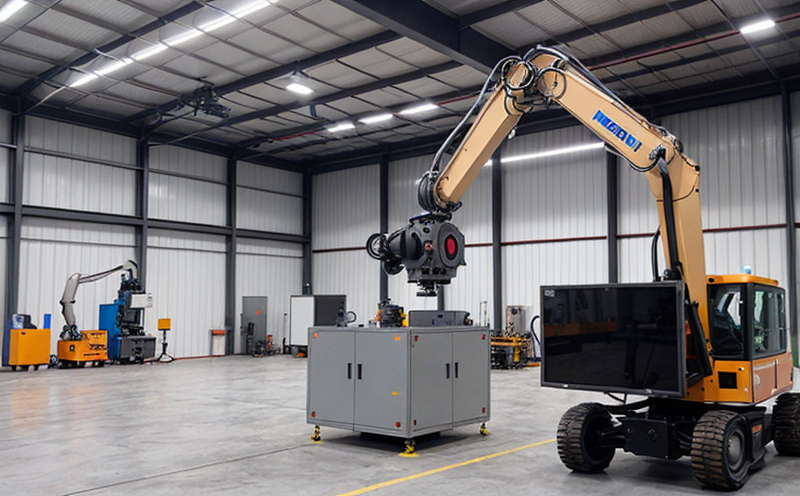EN 50126 Reliability and Availability of Robotics in Manufacturing
The EN 50126 standard is a cornerstone for ensuring the reliability and availability of robotics systems within industrial manufacturing environments. This standard provides critical guidelines that focus on system safety, maintainability, and operational performance over extended periods. Compliance with EN 50126 is essential in industries where robotic systems are integral to production processes, such as automotive, electronics, and aerospace.
The primary goal of this service is to assess the reliability and availability of industrial robots through rigorous testing methodologies. Our expertise lies in simulating real-world operating conditions that a robot might encounter during its lifecycle. We employ advanced diagnostic tools and software to monitor system performance under various stressors, including environmental factors, wear-and-tear, and operational demands.
Our team of engineers uses state-of-the-art equipment to perform these tests, ensuring accurate measurement and analysis. The testing process involves multiple phases: initial setup, baseline testing, continuous monitoring, and final evaluation. This approach allows us to identify potential weaknesses early on, providing manufacturers with actionable insights to improve product design.
One of the key aspects of EN 50126 is its emphasis on risk assessment and management. By identifying risks associated with robotic systems early in the development cycle, we help clients mitigate these risks before they become significant issues. This proactive approach not only enhances safety but also reduces downtime and maintenance costs.
Another critical component of our service involves evaluating how well a robot can adapt to changing environments or tasks without compromising performance. This includes examining factors like energy efficiency, precision, and repeatability. These metrics are crucial for ensuring that robots remain efficient throughout their operational life cycle.
In addition to technical evaluations, we also assess the human-robot interaction aspects of industrial robotic systems. Ensuring safe and effective collaboration between humans and machines is vital for maintaining productivity while safeguarding worker health and safety.
Our comprehensive testing services go beyond mere compliance with EN 50126; they aim at optimizing overall system performance by providing detailed reports that highlight strengths, weaknesses, and areas for improvement. These insights are invaluable resources for both current users seeking to enhance existing systems and future developers looking to innovate within this field.
By leveraging our deep understanding of industrial robotics combined with cutting-edge testing techniques, we ensure that clients receive reliable assessments tailored specifically to their unique needs. Our commitment to precision and thoroughness guarantees high-quality results that contribute significantly towards achieving long-term success in the competitive world of manufacturing automation.
Applied Standards
The application of EN 50126 involves several key aspects which are outlined below:
- System Safety: Ensures that the robotic system operates safely under all expected conditions.
- Maintainability: Focuses on ease of maintenance and repair, ensuring minimal disruption to production schedules.
- Operational Performance: Evaluates how well a robot performs its intended functions over time.
To achieve these objectives, we utilize specific testing protocols based directly on EN 50126 guidelines. These include:
- Initial Setup Testing
- Baseline Performance Measurement
- Continuous Monitoring During Operation
- Final Evaluation Report
The use of these standards ensures consistency and accuracy in our testing processes, which is crucial for maintaining the highest level of quality assurance.
Industry Applications
| Industry Sector | Main Application Areas |
|---|---|
| Automotive Manufacturing | Assembly Line Optimization, Quality Control |
| Electronics Production | Semiconductor Wafer Handling, Precision Assembly |
| Aerospace Engineering | Complex Component Fabrication, Final Inspection |
The application of EN 50126 is particularly relevant to industries where precision and reliability are paramount. For instance, in automotive manufacturing, robots play a crucial role in ensuring consistent quality across large-scale production lines. By adhering strictly to EN 50126 standards during testing, we can help manufacturers achieve optimal performance from their robotic assets.
In electronics production, the delicate nature of semiconductor wafer handling requires precise control systems that minimize errors and maximize yield rates. Our tests ensure these critical components are functioning correctly before they reach final stages of assembly.
The aerospace sector demands even higher levels of accuracy due to stringent regulatory requirements governing safety standards. Robotic systems used in this field must be capable of handling highly specialized tasks with minimal error margins. Through rigorous testing according to EN 50126, we ensure that such systems are fully prepared for deployment.
Customer Impact and Satisfaction
Implementing the EN 50126 standard has numerous positive impacts on customers who engage our services:
- Enhanced Safety: By prioritizing system safety, we reduce potential risks associated with robotic operations.
- Prolonged System Life: Regular maintenance checks and evaluations help extend the useful life of industrial robots.
- Improved Efficiency: Optimized performance leads to reduced downtime and increased productivity.
- Better Decision Making: Detailed reports provide valuable data for informed decision-making regarding future investments or upgrades.
Our approach not only meets but exceeds customer expectations by delivering robust evidence of compliance with international standards. This strengthens our clients' positions in competitive markets, fostering trust and credibility among stakeholders.





